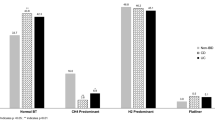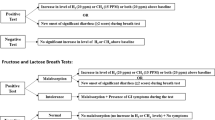Abstract
Studies suggest that subjects with IBS have altered gut flora. Among these findings, methane production is more commonly associated with constipation-predominant symptoms. In this study, we prospectively evaluated the role of methane as a diagnostic test. Consecutive Rome I positive IBS patients referred for a lactulose breath test were eligible to participate. After exclusion criteria, subjects completed a symptom questionnaire grading bloating, diarrhea, and constipation on a VAS scale (0–100 mm). Once completed, a physician interviewed the subjects and rated the subject accordingly, and also determined whether the patient had C-IBS, D-IBS, or neither. Subjects and physicians were blinded to the results of the breath test. The presence of methane in the breath test was compared to the results of the scoring by subjects and physicians. A total of 56 Rome I positive IBS subjects were enrolled. During breath testing, 28 subjects produced methane. Good agreement between physician’s evaluation and the patient’s was seen (diarrhea = 0.69; constipation = 0.69; bloating = 0.62). The severity of constipation was noted to be greater in the methane group (49.3 ± 28.7) than in the non-methane group (25.3 ± 31.47) (P < 0.01). In contrast, diarrhea was less severe in the methane group (12.3 ± 21.0) than the non-methane group (36.7 ± 32.4) (P < 0.01). Out of the 56 patients, 23 C-IBS subjects were identified by the physician. When methane was used to predict the assignment of C-IBS compared to non-C-IBS, it had a sensitivity of 91.7% and a specificity of 81.3% (OR = 47.7, CI = 9.4–232, P < 0.00001). In conclusion, methane is a potential diagnostic test for the identification of C-IBS and may guide treatment.


Similar content being viewed by others
Abbreviations
- IBS:
-
Irritable bowel syndrome
- C-IBS:
-
Constipation-predominant IBS
- D-IBS:
-
Diarrhea-predominant IBS
- LBT:
-
Lactulose breath test
- SIBO:
-
Small intestinal bacterial overgrowth
References
Bommelaer G, Poynard T, Le Pen C, et al. Prevalence of irritable bowel syndrome (IBS) and variability of diagnostic criteria. Gastroenterol Clin Biol. 2004;28:554–561. doi:10.1016/S0399-8320(04)95011-7. PMID: 15243388.
Wilson S, Roberts L, Roalfe A, Bridge P, Singh S. Prevalence of irritable bowel syndrome: a community survey. Br J Gen Pract. 2004;54:495–502. PMID: 15239910.
Gwee KA, Wee S, Wong ML, Png DJ. The prevalence, symptom characteristics, and impact of irritable bowel syndrome in an Asian urban community. Am J Gastroenterol. 2004;99:924–931. doi:10.1111/j.1572-0241.2004.04161.x. PMID: 15128362.
El-Serag HB. Impact of irritable bowel syndrome: prevalence and effect on health-related quality of life. Rev Gastroenterol Disord. 2003;3(Suppl 2):S3–S11. PMID: 12775997.
Hungin AP, Whorwell PJ, Tack J, Mearin F. The prevalence, patterns and impact of irritable bowel syndrome: an international survey of 40,000 subjects. Aliment Pharmacol Ther. 2003;17:643–650. doi:10.1046/j.1365-2036.2003.01456.x. PMID: 12641512.
Agreus L, Svardsudd K, Nyren O, Tibblin G. Irritable bowel syndrome and dyspepsia in the general population: overlap and lack of stability over time. Gastroenterology. 1995;109:671–680. doi:10.1016/0016-5085(95)90373-9. PMID: 7657095.
Drossman DA, Richter JE, Talley NJ, et al., eds. Functional gastrointestinal disorders: diagnosis, pathophysiology and treatment: a multinational consensus. Boston: Little, Brown; 1994.
Thompson WG, Longstreth GF, Drossman DA, et al. Functional bowel disorders and functional abdominal pain. Gut. 1999;45:II43–II47.
Rome Foundation. Guidelines—Rome III diagnostic criteria for functional gastrointestinal disorders. J Gastrointestin Liver Dis. 2006;15:301–312.
Muller-Lissner SA, Fumagalli I, Bardhan KD, et al. Tegaserod, a 5-HT(4) receptor partial agonist, relieves symptoms in irritable bowel syndrome patients with abdominal pain, bloating and constipation. Aliment Pharmacol Ther. 2001;15:1655–1666. doi:10.1046/j.1365-2036.2001.01094.x.
Novick J, Miner P, Krause R, et al. A randomized, double-blind, placebo-controlled trial of tegaserod in female patients suffering from irritable bowel syndrome with constipation. Aliment Pharmacol Ther. 2002;16:1877–1888. doi:10.1046/j.1365-2036.2002.01372.x.
Camilleri M, Mayer EA, Drossman DA, et al. Improvement in pain and bowel function in female irritable bowel patients with alosetron, a 5-HT3 receptor antagonist. Aliment Pharmacol Ther. 1999;13:1149–1159. doi:10.1046/j.1365-2036.1999.00610.x.
Bardhan KD, Bodemar G, Geldof H, et al. A double-blind, randomized, placebo-controlled dose-ranging study to evaluate the efficacy of alosetron in the treatment of irritable bowel syndrome. Aliment Pharmacol Ther. 2000;14:23–34. doi:10.1046/j.1365-2036.2000.00684.x.
Drossman DA, Toner BB, Whitehead WE, et al. Cognitive-behavioral therapy versus education and desipramine versus placebo for moderate to severe functional bowel disorders. Gastroenterology. 2003;125(1):19–31. doi:10.1016/S0016-5085(03)00669-3.
Pimentel M, Chow EJ, Lin HC. Eradication of small intestinal bacterial overgrowth reduces symptoms of irritable bowel syndrome. Am J Gastroenterol. 2000;95:3503–3506. doi:10.1111/j.1572-0241.2000.03368.x.
Nucera G, Gabrielli M, Lupascu A, et al. Abnormal breath tests to lactose, fructose and sorbitol in irritable bowel syndrome may be explained by small intestinal bacterial overgrowth. Aliment Pharmacol Ther. 2005;21:1391–1395. doi:10.1111/j.1365-2036.2005.02493.x.
Majewski M, McCallum RW. Results of small intestinal bacterial overgrowth testing in irritable bowel syndrome patients: clinical profiles and effects of antibiotic trial. Adv Med Sci. 2007;52:139–142.
Lupascu A, Gabrielli M, Lauritano EC, et al. Hydrogen glucose breath test to detect small intestinal bacterial overgrowth: a prevalence case-control study in irritable bowel syndrome. Aliment Pharmacol Ther. 2005;22:1157–1160. doi:10.1111/j.1365-2036.2005.02690.x.
Posserud I, Stotzer PO, Björnsson ES, et al. Small intestinal bacterial overgrowth in patients with irritable bowel syndrome. Gut. 2007;56:802–808. doi:10.1136/gut.2006.108712.
Pimentel M, Chow EJ, Lin HC. Normalization of lactulose breath testing correlates with symptom improvement in irritable bowel syndrome: a double-blind, randomized, placebo-controlled study. Am J Gastroenterol. 2003;98:412–419.
Sharara A, Aoun E, Abdul-Baki H, Mounzer R, Sidani S, ElHajj I. A randomized double-blind placebo-controlled trial of rifaximin in patients with abdominal bloating and flatulence. Am J Gastroenterol. 2006;101:326–333. doi:10.1111/j.1572-0241.2006.00458.x.
Pimentel M, Park S, Mirocha J, Kane S, Kong Y. The effect of a nonabsorbed oral antibiotic (Rifaximin) on the symptoms of the irritable bowel syndrome. Ann Intern Med. 2006;145(8):557–563.
Lembo A, Zakko SF, Ferreira NL, et al. Rifaximin for the treatment of diarrhea-associated irritable bowel syndrome: short-term treatment leading to long-term sustained response. Gastroenterology. 2008;134:A545.
Bratten JR, Spanier J, Jones MP. Lactulose breath testing does not discriminate patients with irritable bowel syndrome from healthy controls. Am J Gastroenterol. 2008;103:958–963. doi:10.1111/j.1572-0241.2008.01785.x.
Pimentel M, Mayer AG, Park S, et al. Methane production during lactulose breath test is associated with gastrointestinal disease presentation. Dig Dis Sci. 2003;48:86–92. doi:10.1023/A:1021738515885.
Grover M, Kanazawa M, Palsson OS, et al. Small intestinal bacterial overgrowth in irritable bowel syndrome: association with colon motility, bowel symptoms, and psychological distress. Neurogastroenterol Motil. 2008;20(9):998–1008. doi:10.1111/j.1365-2982.2008.01142.x.
Pimentel M, Lin HC, Enayati P, et al. Methane, a gas produced by enteric bacteria, slows intestinal transit and augments ileal contractile activity. Am J Physiol Gastrointest Liver Physiol. 2006;290:G1089–G1095. doi:10.1152/ajpgi.00574.2004.
Pimentel M, Chow EJ, Park S, Kong Y. Neomycin improves constipation in IBS in a fashion that is dependent on the presence of methane gas: sub-analysis of a double blind randomized controlled study. Dig Dis Sci. 2006;51:1297–1301. doi:10.1007/s10620-006-9104-6.
Khoshini R, Dai SC, Lezcano S, Pimentel M. A systematic review of diagnostic tests for small intestinal bacterial overgrowth. Dig Dis Sci. 2008;53:1443–1454. doi:10.1007/s10620-007-0065-1.
Chatterjee S, Park S, Low K, Kong Y, Pimentel M. The degree of breath methane production in IBS correlates with the severity of constipation. Am J Gastroenterol. 2007;102:837–841. doi:10.1111/j.1572-0241.2007.01072.x.
Schoenfeld P. Efficacy of current drug therapies in irritable bowel syndrome: what works and does not work. Gastroenterol Clin North Am. 2005;34:319–335. doi:10.1016/j.gtc.2005.02.002.
Acknowledgments
This work was supported by Beatrice and Samuel A. Seaver Foundation.
Author information
Authors and Affiliations
Corresponding author
Rights and permissions
About this article
Cite this article
Hwang, L., Low, K., Khoshini, R. et al. Evaluating Breath Methane as a Diagnostic Test for Constipation-Predominant IBS. Dig Dis Sci 55, 398–403 (2010). https://doi.org/10.1007/s10620-009-0778-4
Received:
Accepted:
Published:
Issue Date:
DOI: https://doi.org/10.1007/s10620-009-0778-4




